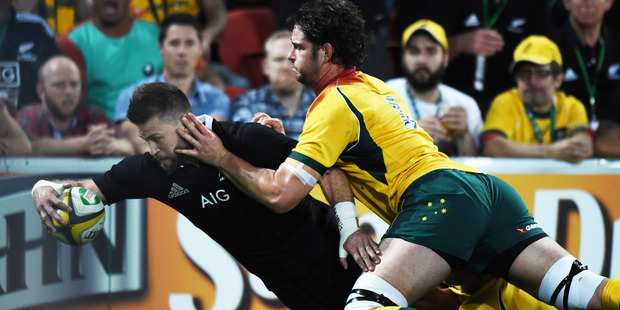11:55 PM Saturday Oct 18, 2014

All Blacks 29
Wallabies 28
Wallabies 28
These All Blacks simply don't know when they are beaten. This was Dublin all over again. Maybe it was even braver because the opposition were better and had given them nothing all night.
They had to pull the rabbit out of the hat when it looked like they surely couldn't. And then, fourth-choice first-five, Colin Slade had to nail a tough conversation. What a kick.
What a game and the All Blacks can wake up this morning and be proud of their courage and commitment. They can look at themselves in the mirror and smile because they know they have once again dodged a bullet.
They will know they inflicted the cruellest blow on a Wallaby team that was probably the better side over the piece. They will know they didn't play anywhere near well enough.
Their skill execution was again poor. They didn't dominate up front and were cleaned up at the tackled ball... and yet they won.
The uplift in skill execution they were after never materialised and, if they are honest, they will know they played with a level of predictability that failed to cause the Wallabies defence enough problems.
The All Blacks talk endlessly, and rightly, about trusting and encouraging their skills. The ambition is beyond fault but there is a balance to strike.
When they carved up the Wallabies at Eden Park, they didn't do it from running deep inside their own territory.
There was more patience and structure to their work. They took the time to blunt the Wallabies first - let them know they didn't have it physically, before then showing them they didn't have it aerobically either.
The modern parlance is to say the All Blacks earned the right to play their wide-wide game and somehow that notion of paying dues has gotten a little lost in the last two tests.
It was the same at Ellis Park, where the All Blacks' preferred exit strategy from kick receipts was to recycle off a forward hitting up and then shifting wide.
That composure and control has gone missing from their game. They have sacrificed accuracy for speed and paid the price. Their execution was largely poor in most facets.
Their biggest worry is the breakdown, where they were again dominated. They couldn't get that quick ball, couldn't wipe out the Wallabies and clean that space for Aaron Smith to whip the ball away.
Without that fast ball, they are not the same team and needed to adapt quicker than they did to play more to their strengths and less to the Wallabies'. It was only in the final 10 minutes that they worked a lineout drive - a tactic that was so effective for them the last time they met the Wallabies.
Still, they got there in the end and they got there against an Australian team that bore no resemblance to the shambles they appeared to be during the week.
It didn't take long to get the answer as to whether the week from hell had split or galvanised the Wallabies. Being under siege suited them rather well, as it happened, and stiffened their resolve to play with what once upon a time, in a more innocent age, would have been known as gay abandon.
The frenetic pace of the game was as much to do with their adventure as it was the All Blacks' and, for the first 60 minutes at least, they looked the more comfortable.
They had obviously watched the way the Springboks had managed to attack the All Blacks at the tackled ball and did pretty well either halting momentum, winning possession or earning a penalty.
They must wonder why they can't deliver that sort of aggression more often, why can't they play with such fervour and purpose every time.
Australia 28 (N. Phipps, B. Foley, A. Ashley-Cooper tries; B. Foley 2 cons, pen, White pen) New Zealand 29 (C. Jane, D. Coles, A. Smith, M. Fekitoa tries; B. Barrett pen, 2 cons; C. Slade con). Halftime: 15-12.

No comments:
Post a Comment